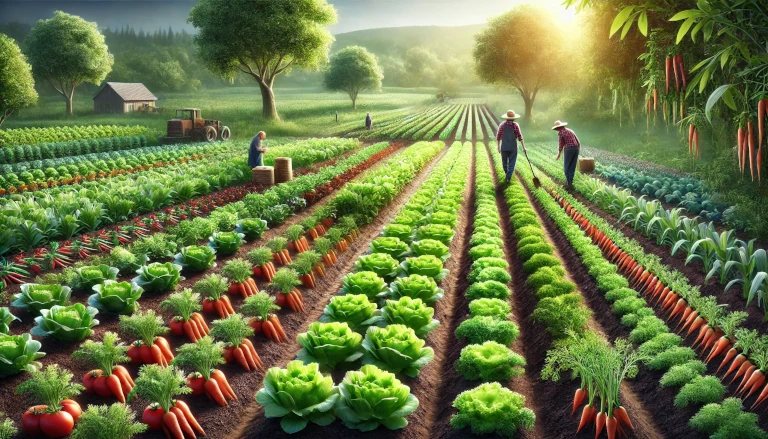Organic vegetable farming is a farming practice that eliminates the use of synthetic fertilizers, pesticides, and genetically modified organisms (GMOs), focusing instead on natural methods of soil and crop care. As consumers increasingly demand chemical-free food, organic vegetable farming offers farmers a chance to meet these demands while protecting the environment and promoting sustainable practices.
What is Organic Vegetable Farming? 🌾
Organic vegetable farming involves growing vegetables without synthetic inputs, relying on natural fertilizers like compost, animal manure, and plant-based nutrients. The goal is to cultivate produce that’s healthier for consumers and the environment by maintaining a balance between soil, plants, and natural organisms.
How to Start Organic Vegetable Farming? 🌱
- Soil Preparation 🌍: Test the soil to understand its composition, nutrient levels, and pH balance. Amend with organic compost or manure if needed.
- Choose the Right Seeds 🌾: Select organic, non-GMO seeds for vegetables best suited to your climate.
- Pest Management 🐞: Use eco-friendly methods like neem oil, garlic sprays, and beneficial insects.
- Watering and Irrigation 💧: Use drip irrigation for water conservation and even distribution.
- Crop Rotation 🔄: Practice crop rotation to maintain soil health and prevent pest build-up.
Where to Grow Organic Vegetables? 🌍
Organic vegetables can be grown on farmlands, gardens, or greenhouses. Organic farming is suitable in regions with good rainfall, moderate temperatures, and fertile soil. Urban farms, greenhouses, and rural farmlands are all suitable options, as long as soil quality and water availability are managed effectively.
When is the Best Time for Organic Vegetable Farming? 📅
The best time to start organic farming depends on the vegetable type and climate:
- Winter Vegetables: Start sowing in late summer or fall.
- Summer Vegetables: Plant seeds in early spring after the last frost.
- Year-Round: With greenhouses, certain vegetables like leafy greens can be cultivated all year.
Why Choose Organic Vegetable Farming? 🌱
Organic vegetable farming offers several benefits:
- Environmental Protection 🌍: No chemicals are used, reducing soil and water pollution.
- Health Benefits 🥗: Organic produce is free from pesticides, providing healthier food for consumers.
- Increased Market Demand 📈: The demand for organic vegetables is high, allowing farmers to charge premium prices.
Advantages of Organic Vegetable Farming 🌿
- Soil Health: Organic practices enhance soil fertility and maintain biodiversity.
- Reduced Environmental Impact: Lower carbon footprint and reduced pollution.
- High Market Demand: Rising consumer awareness for organic food allows premium pricing.
- Sustainability: Organic farming supports long-term agricultural productivity.
Challenges of Organic Vegetable Farming ⚠️
- Time-Intensive: Organic farming requires regular maintenance and monitoring.
- Lower Initial Yield: Yields may be lower in initial years until the soil improves.
- Cost of Certification: Organic certification can be costly and requires meeting strict guidelines.
- Market Competition: Competing with non-organic farms and processed foods can be challenging.
Financial Requirements for Organic Vegetable Farming 💰
- Initial Investment: Costs for organic seeds, soil amendments, and certification range from ₹20,000 to ₹1 lakh per acre, depending on scale.
- Running Costs: Regular costs include organic fertilizers, pest control, labor, and water management.
- Profit Potential: Organic vegetables sell for 20-40% more than conventional produce. Profits depend on the crop yield and market demand but can be achieved within the first 1-2 years.
Targeted Customers for Organic Vegetables 🎯
The primary customers for organic vegetables include:
- Health-Conscious Consumers 🥦: People who prioritize health and wellness.
- Urban Households 🏠: High-income families in urban areas.
- Restaurants and Cafes 🍽️: Establishments focusing on organic or farm-to-table offerings.
- Local Grocery Stores 🛒: Organic sections in stores and supermarkets.
Marketing and Sales of Organic Vegetables 📢
- Farmers’ Markets: Sell directly to consumers at local markets.
- Community Supported Agriculture (CSA): Offer subscription services where customers receive regular boxes of fresh produce.
- Direct Sales to Restaurants: Partner with local restaurants looking for organic supplies.
- Online and Social Media: Use social platforms and e-commerce to reach a larger audience.
- Retail Partnerships: Collaborate with organic stores and supermarkets to stock your produce.
Key Benefits of Organic Vegetable Farming 🌱
- Healthier Produce: Free from harmful chemicals, organic vegetables promote better health.
- Higher Market Value: The premium on organic products offers better returns.
- Environmentally Friendly: Reduces reliance on synthetic chemicals, promoting biodiversity.
- Community Trust: Consumers tend to trust and support local, organic farmers more than large-scale producers.
Limitations of Organic Vegetable Farming ⚠️
- Labor-Intensive: Organic farming requires more manual labor compared to conventional farming.
- Weather-Dependence: Extreme weather can affect organic produce, which lacks synthetic protection.
- Market Awareness: Educating consumers on the benefits of organic farming is essential but can be challenging.
- Certification Complexity: Acquiring and maintaining organic certification requires compliance with standards and regular inspections.
Profit and Loss in Organic Vegetable Farming 📈
While organic vegetable farming has a higher initial cost, it also offers greater profitability in the long term:
- Break-Even Point: Usually within the first 1-2 years, depending on market prices and demand.
- Potential Profits: High due to premium pricing, although they depend on crop success and customer reach.
- Loss Risks: Environmental factors and market competition can impact revenue. Diversifying crops and maintaining customer loyalty helps reduce risks.
Is Organic Vegetable Farming Right for You? 🌱💼
Organic vegetable farming is an ideal choice for farmers who want to tap into the growing demand for chemical-free produce. With rising health consciousness among consumers, this form of agriculture promises both financial rewards and sustainability benefits. Though it requires a more hands-on approach, with proper market research and customer engagement, organic farming can be a lucrative and eco-friendly venture.
This guide covers everything about organic vegetable farming, from setup to profitability, offering farmers a sustainable way to meet market demand for organic produce.
Discover more from Green Ecosystem - Renewable Energy, Agriculture, and Environmental Sustainability
Subscribe to get the latest posts sent to your email.


